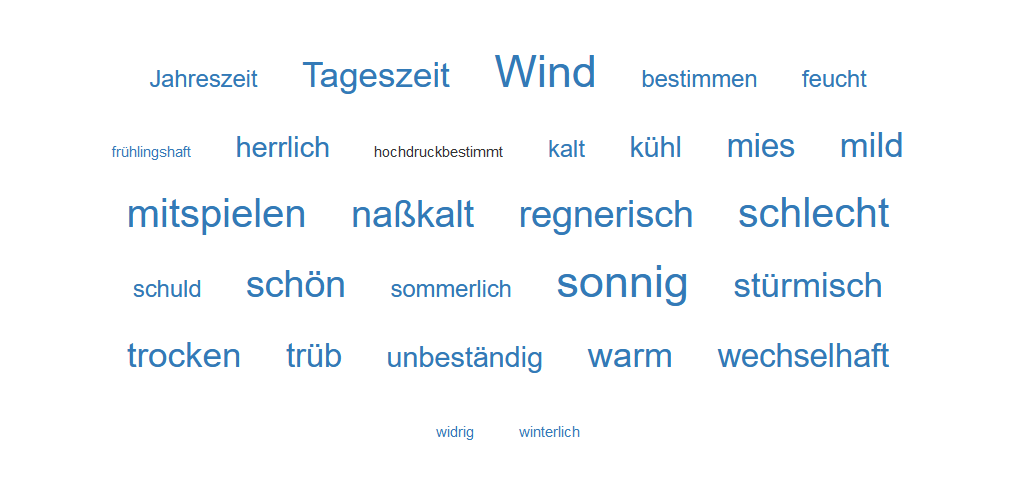Vocabulary Module 1: Wetter
In this module, you will learn some vocabulary to talk about weather (das Wetter) using Das Digitale Wörterbuch der Deutschen Sprache (DWDS), a large electronic collection of German texts known as a corpus. Let’s explore what words German speakers use to describe the weather. Go to the DWDS homepage and type Wetter in the search box. You will be taken to a page that gives you a lot of information about this word, but we will focus on the word cloud, which is available in the Typische Verbindungen section.

The word cloud above shows words that commonly occur with the word Wetter; such words are known as collocates. The larger the word is in the cloud, the more frequently it co-occurs with Wetter. You can also see a numerical representation of the frequency of co-occurrence by looking at the Überblick table for Wetter accessible through the Detailliertere Informationen link above the word cloud.
Activity 1
Now, let’s review the meaning of some German adjectives from this word cloud by matching them with their English equivalents. If needed, you can consult the online dictionary LEO.
Let’s explore some more of these adjectives with the help of the DWDS corpus.
Activity 2
After looking at the words in the word cloud for Wetter you most likely recognized that most of the words you see are adjectives. Can you identify four adjectives that are associated with clement weather and three adjectives that are associated with inclement weather? If needed, you can consult LEO.
Activity 3
If you click on the word regnerisch in the word cloud, you will be taken to a DWDS page for regnerisch. When you get there, scroll down to the Typische Verbindungen section to find the word cloud that you will need to complete the activities that follow.
A.
You can see that three of the most used words with regnerisch are the nouns Wintertag, Sommertag and Herbsttag. Can you figure out what they, and also Frühlingstag, mean?
If you click on each of these nouns in the word cloud for regnerisch, you can see what other adjectives are frequently used to describe them. For example:
Wintertag: bitterkalt, eiskalt, frostig
Sommertag: heiß, schwül, wunderschön
Herbsttag: golden, neblig, regnerisch
If you type Frühlingstag into the search box on the DWDS homepage, you will find the adjectives frequently used to describe it.
Frühlingstag: herrlich, prächtig, strahlend
B.
Which noun does NOT refer to sunny weather?
C.
Read the sentences below, which contain examples of the expression sonniges Gemüt taken from from the DWDS corpus.
-
- «Er ist ein fröhlicher Junge mit einem sonnigen Gemüt.»
Die Zeit, 18.02.2013 (online) - Nie hat ihn sein sonniges Gemüt verlassen.
Die Zeit, 07.07.2011, Nr. 28 - Ein kräftiger Kerl mit sonnigem Gemüt.
Die Zeit, 07.08.2003, Nr. 33
- «Er ist ein fröhlicher Junge mit einem sonnigen Gemüt.»
What is the closest English equivalent for sonniges Gemüt?
Activity 4
Now let’s find out more about the use of kalt, a collocate of Wetter. Do a search in the DWDS for the word kalt and then go to its Typische Verbindungen section (word cloud). Keep that information handy as you complete the following activities.
A.
Among the words from this word cloud, which one is NOT used with kalt in its literal meaning?
B.
Read the sentences below, which contain examples of the expression kalte Schulter taken from the DWDS corpus.
-
- Auch Google zeigte Zuckerberg die kalte Schulter.
Die Zeit, 03.03.2015 (online) - Bislang haben die Deutschen den Populisten die kalte Schulter gezeigt.
Die Zeit, 30.05.2012, Nr. 22 - Die Glücksgöttin zeigt Hamilton weiter die kalte Schulter.
Die Zeit, 18.04.2016 (online)
- Auch Google zeigte Zuckerberg die kalte Schulter.
What is the closest English meaning for die kalte Schulter zeigen?
Activity 5
Now let’s find out more about the use of stürmisch, a collocate of Wetter. Do a search in the DWDS for the word stürmisch and then go to its Typische Verbindungen section (word cloud). Keep that information handy as you complete the following activities.
A.
The following nouns are in this word cloud because they are associated with stürmisch. Can you identify two that are associated with nature and three that are associated with social events?
B.
Read the sentences below, which contain examples of the expressions stürmischer Applaus, stürmischer Beifall, and stürmische Ovation taken from the DWDS corpus.
- Stürmischen Applaus hat der tschechische Schlagerstar Karel Gott bei seinem ersten Auftritt auf einem Rockfestival geerntet.
Die Zeit, 05.07.2013 (online) - Die Menge feierte den früheren Präsidenten nach der Rede mit stürmischem Beifall.
Die Zeit, 03.09.2010 (online) - NEW YORK – Die UN gab einen Empfang für den Weltraumflieger Glenn, der sich zu den stürmischsten Ovationen auswuchs.
Die Zeit, 09.03.1962, Nr. 10
What is the closest English equivalent for stürmischer Applaus / stürmischer Beifall / stürmische Ovation?
Activity 6
On your own. Explore the usage of a few other adjectives using the word cloud for Wetter!
Activity 7
On your own. Using 3-5 adjectives and 3-5 nouns from this module, write two sentences describing the weather of the month in which you were born and two sentences describing the weather today. Pay careful attention to which nouns and adjectives frequently go together! If you want, you may add in any idiomatic expressions that you have learned.
For example:
Im November ist das Wetter oft kalt und nass.
Heute ist ein milder und trockener Frühlingstag, und ich habe auch ein sonniges Gemüt!
Schirin Kourehpaz & Nina Vyatkina

